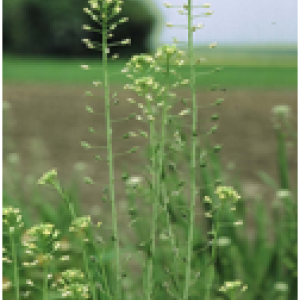This research shows that it is possible to modify plant seeds to produce omega 3 fatty acids. Through a process of genetic modification, the research modifies the plant Camelina sativa (false flax) with genes from microalgae – the main producers of the omega 3 fatty acids DHA and EPA. The oil extracted from the seeds can then be used as a more sustainable alternative to fish oils.
These fatty acids are not produced directly by fish but accumulated through their consumption of other marine organisms, such as algae, or, in the case of farmed fish, through their consumption of omega 3-containing fishmeal and fish oil. One of the major motivations driving this research is the concern that there is not enough omega 3 rich fish meal and fish oil being produced in the world to sustain the great increase we are seeing in aquaculture production. The next step is to analyse the effects that feeding fish with these oils has on the omega 3 properties of their flesh.
Abstract
Omega-3 (also called n-3) long-chain polyunsaturated fatty acids (≥C20; LC-PUFAs) are of considerable interest, based on clear evidence of dietary health benefits and the concurrent decline of global sources (fish oils). Generating alternative transgenic plant sources of omega-3 LC-PUFAs, i.e. eicosapentaenoic acid (20:5 n-3, EPA) and docosahexaenoic acid (22:6 n-3, DHA) has previously proved problematic. Here we describe a set of heterologous genes capable of efficiently directing synthesis of these fatty acids in the seed oil of the crop Camelina sativa, while simultaneously avoiding accumulation of undesirable intermediate fatty acids. We describe two iterations: RRes_EPA in which seeds contain EPA levels of up to 31% (mean 24%), and RRes_DHA, in which seeds accumulate up to 12% EPA and 14% DHA (mean 11% EPA and 8% DHA). These omega-3 LC-PUFA levels are equivalent to those in fish oils, and represent a sustainable, terrestrial source of these fatty acids. We also describe the distribution of these non-native fatty acids within C. sativa seed lipids, and consider these data in the context of our current understanding of acyl exchange during seed oil synthesis.
Citation
Ruiz-Lopez, N., Haslam, R. P., Napier, J. A. and Sayanova, O, 2014, Successful high-level accumulation of fish oil omega-3 long-chain polyunsaturated fatty acids in a transgenic oilseed crop. The Plant Journal, doi: 10.1111/tpj.12378
You can read the full article in the Plant journal here and an article from BBC discussing the research here. For more about fish and aquaculture on the FCRN website see here








Post a new comment »